Intro
Discover the growing demand for Sterile Processing Technicians and explore job opportunities in this vital healthcare role. Learn about the responsibilities, skills, and certifications required for success. Get insider tips on the hiring process and find out how to land a Sterile Processing Technician job in hospitals, clinics, and medical facilities.
The healthcare industry is constantly growing, and with it, the demand for skilled professionals who can ensure the safety and effectiveness of medical procedures. One crucial role that plays a vital part in this process is the Sterile Processing Technician (SPT). In this article, we will delve into the world of SPTs, exploring the job opportunities, requirements, and the hiring process.
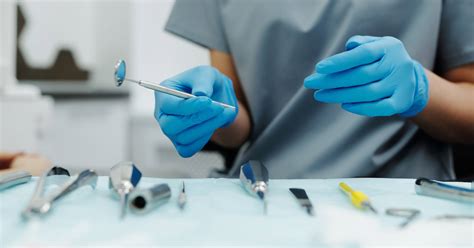
What is a Sterile Processing Technician?
A Sterile Processing Technician is a healthcare professional responsible for the cleaning, disinfection, and sterilization of medical equipment and instruments. Their primary goal is to ensure that all medical equipment is safe for use on patients, reducing the risk of infection and contamination. SPTs work closely with medical staff, nurses, and other healthcare professionals to ensure the smooth operation of hospitals, clinics, and other healthcare facilities.
Key Responsibilities of a Sterile Processing Technician
Some of the key responsibilities of an SPT include:
- Cleaning and disinfecting medical equipment and instruments
- Sterilizing equipment using various methods, such as autoclaving and dry heat sterilization
- Assembling and packaging sterilized equipment for use in medical procedures
- Maintaining accurate records of sterilization and equipment maintenance
- Collaborating with medical staff to ensure the availability of sterile equipment
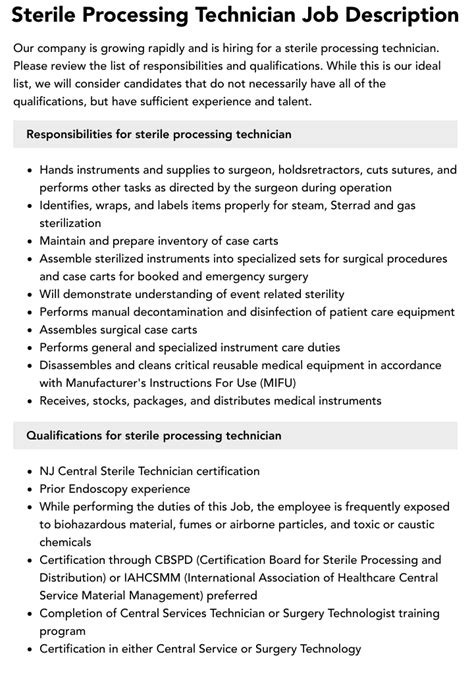
Job Opportunities for Sterile Processing Technicians
The demand for SPTs is on the rise, driven by the growing need for healthcare services and the increasing emphasis on patient safety. According to the Bureau of Labor Statistics, employment of medical equipment preparers, including SPTs, is projected to grow 11% from 2020 to 2030, faster than the average for all occupations.
Some of the top industries that hire SPTs include:
- Hospitals and health systems
- Clinics and outpatient facilities
- Medical device manufacturers
- Sterilization and cleaning services companies
- Government agencies
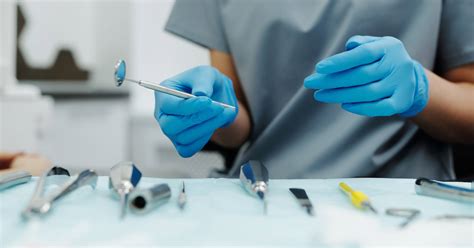
Top Cities for Sterile Processing Technician Jobs
Some of the top cities for SPT jobs include:
- New York City, NY
- Los Angeles, CA
- Chicago, IL
- Houston, TX
- Phoenix, AZ
These cities have a high concentration of hospitals, clinics, and medical device manufacturers, creating a strong demand for skilled SPTs.
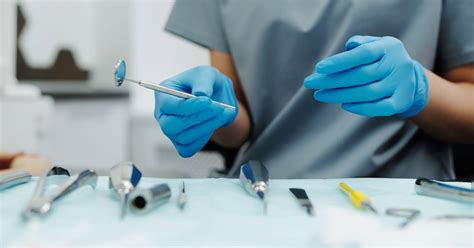
Requirements for Sterile Processing Technicians
To become an SPT, you typically need to meet the following requirements:
- Earn a high school diploma or equivalent
- Complete a training program in sterile processing, such as a certificate or associate's degree
- Obtain certification, such as the Certified Registered Central Service Technician (CRCST) or the Certified Sterile Processing Technician (CSPT)
- Gain experience in a healthcare setting, such as a hospital or clinic
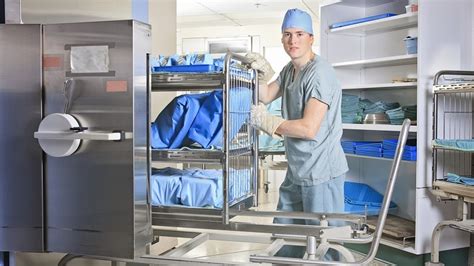
Certifications for Sterile Processing Technicians
Certifications are an essential part of becoming an SPT. Some of the top certifications include:
- Certified Registered Central Service Technician (CRCST)
- Certified Sterile Processing Technician (CSPT)
- Certified Central Service Technician (CCST)
These certifications demonstrate your expertise and commitment to the field, making you a more attractive candidate to potential employers.
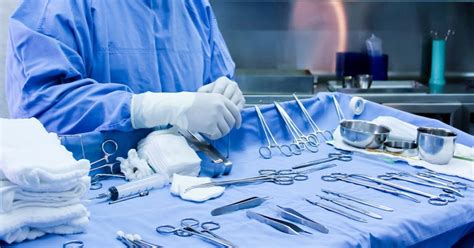
Hiring Guide for Sterile Processing Technicians
If you're looking to hire an SPT, here are some tips to consider:
- Look for candidates with relevant experience in a healthcare setting
- Check for certifications, such as the CRCST or CSPT
- Consider candidates with a strong understanding of sterilization and infection control principles
- Evaluate candidates' ability to work effectively in a team environment
- Assess candidates' attention to detail and organizational skills
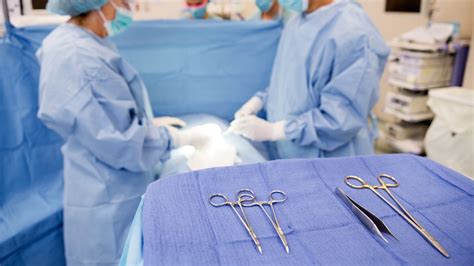
Interview Questions for Sterile Processing Technicians
Some common interview questions for SPTs include:
- What do you know about sterilization and infection control principles?
- Can you describe your experience working in a healthcare setting?
- How would you handle a situation where equipment is not properly sterilized?
- Can you explain the importance of maintaining accurate records in a sterile processing department?
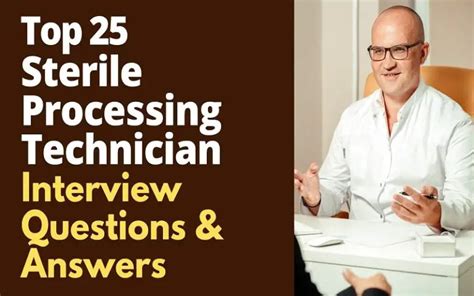
Conclusion
Sterile Processing Technicians play a vital role in ensuring the safety and effectiveness of medical procedures. With the growing demand for healthcare services, the job opportunities for SPTs are on the rise. By understanding the requirements, certifications, and hiring process, you can set yourself up for success in this rewarding career.
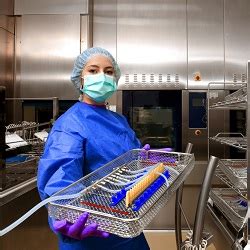
We hope this article has provided you with valuable insights into the world of Sterile Processing Technicians. If you have any questions or comments, please feel free to share them below.
What is the average salary for a Sterile Processing Technician?
+The average salary for a Sterile Processing Technician is around $45,000 per year, depending on location, experience, and employer.
What certifications are available for Sterile Processing Technicians?
+Some of the top certifications for Sterile Processing Technicians include the Certified Registered Central Service Technician (CRCST) and the Certified Sterile Processing Technician (CSPT).
What are the top industries that hire Sterile Processing Technicians?
+Some of the top industries that hire Sterile Processing Technicians include hospitals and health systems, clinics and outpatient facilities, medical device manufacturers, and sterilization and cleaning services companies.
